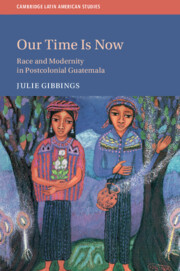Book contents
- Our Time Is Now
- Cambridge Latin American Studies
- Our Time Is Now
- Copyright page
- Dedication
- Contents
- Maps, Figures, and Tables
- Acknowledgments
- Introduction
- Part I Translating Modernities
- Part II Aspirations and Anxieties of Unfulfilled Modernities
- Conclusion
- Glossary
- Index
- Cambridge Latin American Studies (continue from page ii)
Introduction
History Will Write Our Names
Published online by Cambridge University Press: 01 July 2020
- Our Time Is Now
- Cambridge Latin American Studies
- Our Time Is Now
- Copyright page
- Dedication
- Contents
- Maps, Figures, and Tables
- Acknowledgments
- Introduction
- Part I Translating Modernities
- Part II Aspirations and Anxieties of Unfulfilled Modernities
- Conclusion
- Glossary
- Index
- Cambridge Latin American Studies (continue from page ii)
Summary
The introduction highlights how Guatemalan state-building in the nineteenth century continually rendered Mayas as anachronistic subjects rather than agents of the future. Guatemalan state officials and coffee planters labeled certain forms of difference uncivilized or anachronistic to justify denying citizenship rights and to legitimize the application of coerced labor laws to individuals deemed not yet civilized. However, as the Introduction highlights, Q’eqchi’ Mayas continually undermined these strategies and built innovative political modernities based on a combination of radical liberalism and Q’eqchi’ cosmologies. The Introduction provides an overview of how modern notions of linear, measurable time and space and racial-capitalism–based political modernities and colonialism interact. Finally, it provides a methodology for reading along and against the archival grain and for dialoguing with disparate visual, textual, and oral sources.
Keywords
- Type
- Chapter
- Information
- Our Time is NowRace and Modernity in Postcolonial Guatemala, pp. 1 - 32Publisher: Cambridge University PressPrint publication year: 2020

